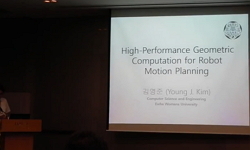Time-predictability of computing is critical for hard real-time and safety-critical systems. However, currently there is no metric available to quantitatively evaluate time-predictability, a feature crucial to the design of time-predictable processors...
http://chineseinput.net/에서 pinyin(병음)방식으로 중국어를 변환할 수 있습니다.
변환된 중국어를 복사하여 사용하시면 됩니다.
- 中文 을 입력하시려면 zhongwen을 입력하시고 space를누르시면됩니다.
- 北京 을 입력하시려면 beijing을 입력하시고 space를 누르시면 됩니다.
https://www.riss.kr/link?id=A105099034
- 저자
- 발행기관
- 학술지명
- 권호사항
-
발행연도
2014
-
작성언어
English
- 주제어
-
등재정보
SCOPUS
-
자료형태
학술저널
-
수록면
34-42(9쪽)
- 제공처
-
0
상세조회 -
0
다운로드
부가정보
다국어 초록 (Multilingual Abstract)
Time-predictability of computing is critical for hard real-time and safety-critical systems. However, currently there is no metric available to quantitatively evaluate time-predictability, a feature crucial to the design of time-predictable processors. This paper first proposes the concept of architectural time-predictability, which separates the time variation due to hardware architectural/microarchitectural design from that due to software. We then propose the standard deviation of clock cycles per instruction (CPI), a new metric, to measure architectural time-predictability. Our experiments confirm that the standard deviation of CPI is an effective metric to evaluate and compare architectural time-predictability for different processors.
동일학술지(권/호) 다른 논문
-
Analysis and Improvement of the Bacterial Foraging Optimization Algorithm
- 한국정보과학회
- Jun Li
- 2014
- SCOPUS
-
An Exponential Smoothing Adaptive Failure Detector in the Dual Model of Heartbeat and Interaction
- 한국정보과학회
- Zhiyong Yang
- 2014
- SCOPUS
-
Comparing Separate and Statically-Partitioned Caches for Time-Predictable Multicore Processors
- 한국정보과학회
- Lan Wu
- 2014
- SCOPUS
-
Exploiting Standard Deviation of CPI to Evaluate Architectural Time-Predictability
- 한국정보과학회
- Wei Zhang
- 2014
- SCOPUS
분석정보
연관 공개강의(KOCW)
-

Fundamentals of Reliability and defects –basics and selected topics for advanced materials and technologies
광주과학기술원 루이지 판티사노 -

Performance Management of a Headteacher
Teachers TV Teachers TV -

Performance Management
Teachers TV Teachers TV -

Performance Management
Teachers TV Teachers TV -

High Performance Geometric Computation for Robot Motion Planning
이화여자대학교 김영준





 ScienceON
ScienceON

